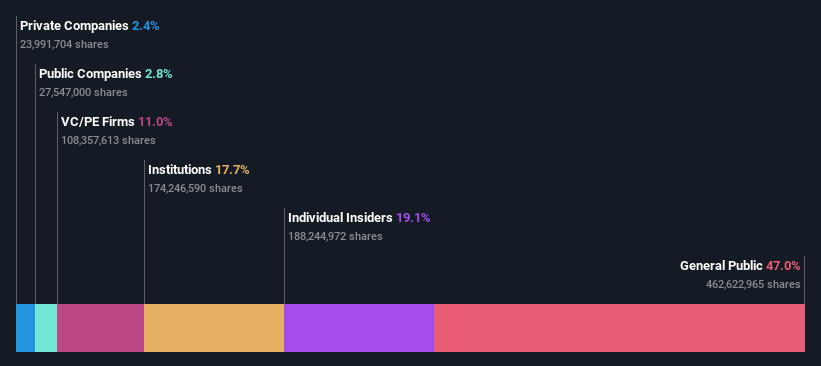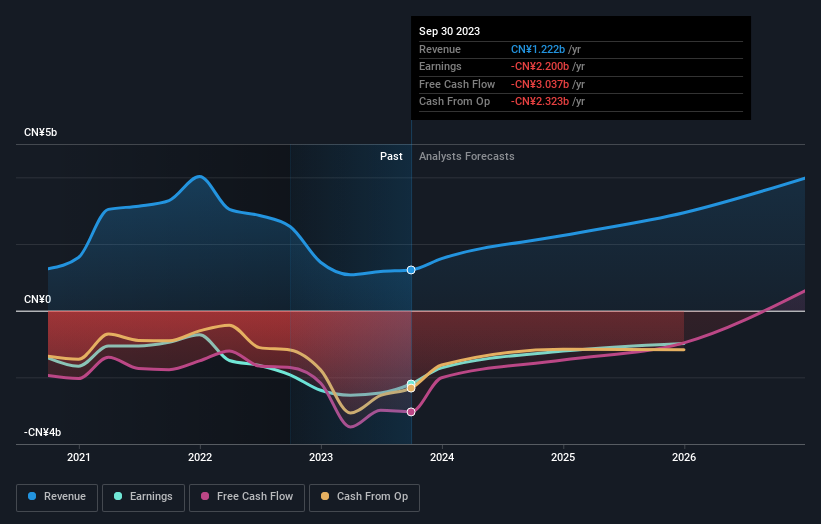Stock Analysis
Individual investors who hold 47% of Shanghai Junshi Biosciences Co., Ltd. (HKG:1877) gained 8.2%, insiders profited as well

Key Insights
- The considerable ownership by individual investors in Shanghai Junshi Biosciences indicates that they collectively have a greater say in management and business strategy
- A total of 25 investors have a majority stake in the company with 49% ownership
- Insiders own 19% of Shanghai Junshi Biosciences
To get a sense of who is truly in control of Shanghai Junshi Biosciences Co., Ltd. (HKG:1877), it is important to understand the ownership structure of the business. With 47% stake, individual investors possess the maximum shares in the company. In other words, the group stands to gain the most (or lose the most) from their investment into the company.
Individual investors gained the most after market cap touched HK$29b last week, while insiders who own 19% also benefitted.
In the chart below, we zoom in on the different ownership groups of Shanghai Junshi Biosciences.
View our latest analysis for Shanghai Junshi Biosciences

What Does The Institutional Ownership Tell Us About Shanghai Junshi Biosciences?
Institutions typically measure themselves against a benchmark when reporting to their own investors, so they often become more enthusiastic about a stock once it's included in a major index. We would expect most companies to have some institutions on the register, especially if they are growing.
We can see that Shanghai Junshi Biosciences does have institutional investors; and they hold a good portion of the company's stock. This suggests some credibility amongst professional investors. But we can't rely on that fact alone since institutions make bad investments sometimes, just like everyone does. It is not uncommon to see a big share price drop if two large institutional investors try to sell out of a stock at the same time. So it is worth checking the past earnings trajectory of Shanghai Junshi Biosciences, (below). Of course, keep in mind that there are other factors to consider, too.

Shanghai Junshi Biosciences is not owned by hedge funds. Our data suggests that Jun Xiong, who is also the company's Top Key Executive, holds the most number of shares at 13%. When an insider holds a sizeable amount of a company's stock, investors consider it as a positive sign because it suggests that insiders are willing to have their wealth tied up in the future of the company. For context, the second largest shareholder holds about 11% of the shares outstanding, followed by an ownership of 4.4% by the third-largest shareholder.
A deeper look at our ownership data shows that the top 25 shareholders collectively hold less than half of the register, suggesting a large group of small holders where no single shareholder has a majority.
While it makes sense to study institutional ownership data for a company, it also makes sense to study analyst sentiments to know which way the wind is blowing. There are a reasonable number of analysts covering the stock, so it might be useful to find out their aggregate view on the future.
Insider Ownership Of Shanghai Junshi Biosciences
The definition of company insiders can be subjective and does vary between jurisdictions. Our data reflects individual insiders, capturing board members at the very least. Management ultimately answers to the board. However, it is not uncommon for managers to be executive board members, especially if they are a founder or the CEO.
Insider ownership is positive when it signals leadership are thinking like the true owners of the company. However, high insider ownership can also give immense power to a small group within the company. This can be negative in some circumstances.
It seems insiders own a significant proportion of Shanghai Junshi Biosciences Co., Ltd.. It is very interesting to see that insiders have a meaningful HK$5.5b stake in this HK$29b business. Most would say this shows a good degree of alignment with shareholders, especially in a company of this size. You can click here to see if those insiders have been buying or selling.
General Public Ownership
With a 47% ownership, the general public, mostly comprising of individual investors, have some degree of sway over Shanghai Junshi Biosciences. This size of ownership, while considerable, may not be enough to change company policy if the decision is not in sync with other large shareholders.
Private Equity Ownership
With an ownership of 11%, private equity firms are in a position to play a role in shaping corporate strategy with a focus on value creation. Some might like this, because private equity are sometimes activists who hold management accountable. But other times, private equity is selling out, having taking the company public.
Next Steps:
It's always worth thinking about the different groups who own shares in a company. But to understand Shanghai Junshi Biosciences better, we need to consider many other factors. For example, we've discovered 1 warning sign for Shanghai Junshi Biosciences that you should be aware of before investing here.
Ultimately the future is most important. You can access this free report on analyst forecasts for the company.
NB: Figures in this article are calculated using data from the last twelve months, which refer to the 12-month period ending on the last date of the month the financial statement is dated. This may not be consistent with full year annual report figures.
Valuation is complex, but we're helping make it simple.
Find out whether Shanghai Junshi Biosciences is potentially over or undervalued by checking out our comprehensive analysis, which includes fair value estimates, risks and warnings, dividends, insider transactions and financial health.
View the Free AnalysisHave feedback on this article? Concerned about the content? Get in touch with us directly. Alternatively, email editorial-team (at) simplywallst.com.
This article by Simply Wall St is general in nature. We provide commentary based on historical data and analyst forecasts only using an unbiased methodology and our articles are not intended to be financial advice. It does not constitute a recommendation to buy or sell any stock, and does not take account of your objectives, or your financial situation. We aim to bring you long-term focused analysis driven by fundamental data. Note that our analysis may not factor in the latest price-sensitive company announcements or qualitative material. Simply Wall St has no position in any stocks mentioned.
About SEHK:1877
Shanghai Junshi Biosciences
A biopharmaceutical company, engages in the discovery, development, and commercialization of various drugs in the therapeutic areas of oncology, metabolic, autoimmune, neurologic, nervous system, and infectious diseases in the People’s Republic of China.
Excellent balance sheet and slightly overvalued.

